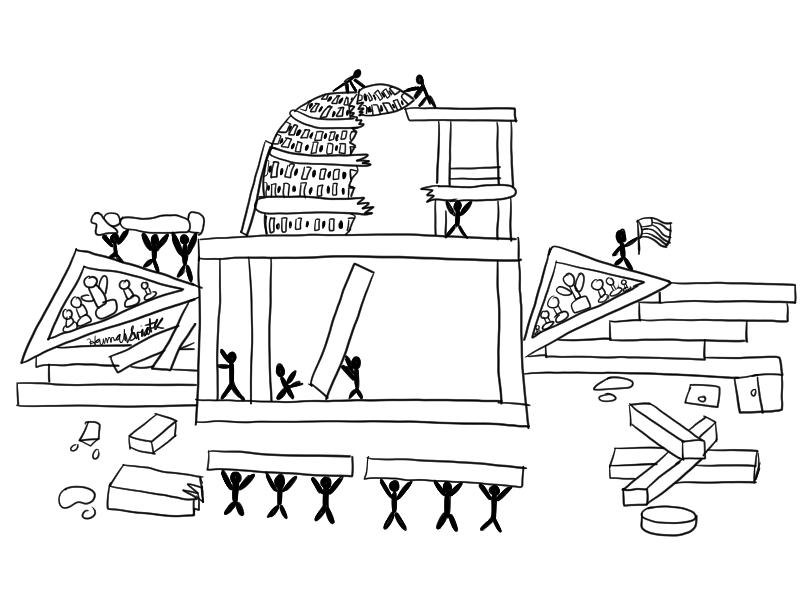Part 1 of 2: We must extricate the world from the grips of unethical, antidemocratic capitalism
The events of January 6 at the Capitol constituted a phase of an unmasking — long in the works, of the rotting carcass of a system in the US which allowed for and produced the events of Jan. 6, in addition to Trump’s presidency, systemic racism, the dismal state of the environment, polarization, misinformation, and more symptoms (which interact with and exacerbate each other) of the disease-ridden American system and body politic: symptoms left untreated for so long because they benefit and are caused by the private sector and its brand of shortsighted, inhumane capitalism. For instance, in the fiscal status quo, animals, plants, and ecosystems are more valuable dead than alive, and human beings are more valuable spending time on the internet than, say, going on a hike — and that time spent on the internet, while benefiting corporations, negatively affects society in a host of ways.
After Jan. 6’s coup attempt, brought about by uniquely American, white supremacist, antidemocratic, paramilitary violence (to use some of historian Gregory Downs’ terminology), I felt the same embarrassment at my Americanness as I did the day after Trump was elected president in November of 2016. For this fledgling generation, growing independent in the age of Trumpism lends a moral ownership of American shortcomings and produces a will to rectify the disgraceful state of affairs which produced Trump’s presidency and his recent coup attempt. To act meaningfully, one must understand the forces behind the curtain of American exceptionalism and observe the strings which they manipulate — some of which masterminded the most recent horrid DC puppet show. To the best of my limited knowledge of these forces, the world must undergo a complete reformation of the simplest mechanisms behind the curtain towards the goal of a humane internet and an economic system of positional analysis (which will be detailed in Part 2 of 2).
In exploring select symptoms of the systemic malady and outlining a potential systemic cure, this relatively brief and uninformed piece overlooks many issues, including racial capitalism and animal agriculture. Nevertheless, a renovation of society’s innermost functions addressing symptoms outlined in this piece would address those overlooked symptoms as well.
Instrumental to the dissemination of conspiracy theories and popularization of cults of personality, the monetization of the internet through advertisements is a systemic societal detriment. When the scaffolding of the internet was established, Jaron Lanier explains, tech pioneers saw their creations as cost-free, accessible means of communication and connection. However, they also dreamed of large profit margins and corporate power. The solution to this contradiction was the advertising model, which, to start, was acceptable, but as technology evolved, the monetization strategy devolved into behavior modification.
For the advertising model to succeed, social networks must be able to guarantee sponsors the attention of large audiences and the modification of their behaviors. In other words, social networks’ business model deals in human time and human futures, as was repeated in the documentary “The Social Dilemma,” upon which much of this section is founded.
To maximize the investment of human time into social networks, users must become addicted. Tech companies create addictive products by manipulating the human psyche and “persuading it” to almost unconsciously behave in certain ways. According to Tristan Harris (specifically 1; 2), a former Google employee and founder of the Center for Humane Technology, some techniques used by persuasive computing algorithms, which use machine learning and artificial intelligence to craft ever-more-addictive feeds and queues, are intermittent variable rewards (for instance, when users refresh a page or pick up phones as if playing a slot machine for a random update), manipulation of social reciprocity (the principle guiding Snapchat streaks), and infinite feeds or autoplay. On top of these strategies and others, social networks must compete with each other for users’ finite time. This competition results in a persuasive-technology arms race and phones which exact more and more of the world’s attention. Already, it is apparent that the world of technology must be re-envisioned to work towards different goals in interacting with lives.
Yet the fact that phones are able to affect behavior, thoughts, and feelings even outside of the time during which they are used cements such a conclusion. It is clear to experts such as Harris that social networks change notions of democracy, society’s mode of conversing, and users’ ability to have meaningful conversations. Concepts such as internet rabbit holes draw society apart by radicalizing ideologies, and social networks’ structures facilitate hate speech. Because persuasive technology deals in the covert manipulation of the brain stem, or “lizard brain,” content which induces outrage in a user is more valuable to further user interaction than one which does not. In effect, these social networks lend people like Donald Trump an enhanced platform to reach users because of his inflammatory rhetoric and to polarize society. This, coupled with the tendency of users to misplace trust in online websites, people, and videos (according to a specialist at Stanford), and with the fact that, as Harris said, organizations “can precisely target a lie directly to the people who are most susceptible,” means that organizations which propagate fake news and conspiracy theories are more influential than ever before. Governments, as well as essentially de facto governing corporations, are therefore able to buy their way into the public consciousness, worming their agendas and messages into users’ minds. Real-world consequences of these facts such as the storming of the Capitol will continue to manifest and worsen.
One may ask themself, why have these issues not been addressed? The answer lies in the current capitalist system. In the realm of the financial system, companies have one goal: to increase the value of their stock. For technology industries, the structure of the internet belies that the most effective way to increase stock value is to sell advertisements and influence. From there arises the race for attention and the above host of problems it causes.
To solve these worrisome problems, Harris outlines four steps in order to create humane technology: to come to terms with the fact that technology manipulates humans, to match “the goals of the persuader with the goals of the persuadee,” to shelter users from being persuaded by corporations, and to empower users to self-determine how they use their time and thoughts. Because of the extreme power of tech giants, which has been demonstrated in the social media bans of Trump and others following the events of January 6, the implementation of this solution would not be an obstacle in the slightest. To integrate Harris’ philosophy in other realms of society, rather than rely on the will of corporations to shift their moral codes, the framework of the economy must be altered to reflect complex societal goals and the morality of political and economic actions.
Martin Luther King (whose quote, funnily enough, I saw on Instagram), after outlining some of the problems faced by today’s capitalist society, aptly expresses one of the core takeaways of this piece, that because “we know the system will not change the rules, we are going to have to change the system.”
An alternative political-economic framework emerges in the exploration of systemic environmental issues, [which will be discussed in Part 2 of 2 of this piece.]
Hello there! Our goal is to provide relavent, engaging journalism for readers of all ages. Your donation will support the student journalists of the Wolfpacket at Claremont High School, and will allow us to purchase equipment, print our monthly issues, and enter in journalism competitions. We appreciate your consideration!

A senior in his third year on the Wolfpacket staff, Rowan Orlijan-Rhyne, occasionally referred to as Rowan “Orange Rind” by his Wolfpacket peers, strives...






